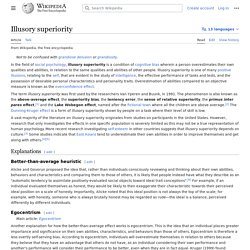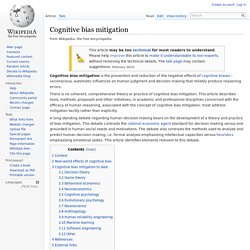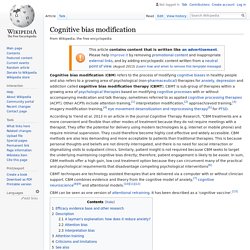

Learning how to think and to argue, as well as learning how to deal with the cognitive biases and traps that keep us from hearing what we're really saying, hearing what others are really saying, and preferring answers that make us feel good to answers that are true.
Codex des Biais Cognitifs.
List of cognitive biases - Wikipedia. Systematic patterns of deviation from norm or rationality in judgment The loss aversion cognitive bias has been shown in monkeys Cognitive biases are systematic patterns of deviation from norm and/or rationality in judgment. They are often studied in psychology and behavioral economics.[1] Although the reality of most of these biases is confirmed by reproducible research,[2][3] there are often controversies about how to classify these biases or how to explain them.[4] Gerd Gigerenzer has criticized the framing of cognitive biases as errors in judgment, and favors interpreting them as arising from rational deviations from logical thought.[5] Explanations include information-processing rules (i.e., mental shortcuts), called heuristics, that the brain uses to produce decisions or judgments.
There are also controversies over some of these biases as to whether they count as useless or irrational, or whether they result in useful attitudes or behavior.
Biais mnésiques. Biais de jugement. Biais de raisonnement. Biais liés à la personnalité. Autres types de biais. Processus cognitifs / psychologiques sous-jascents aux biais cognitifs. Conséquences des biais coginitifs. Seize biais qui empêchent de se connaître et de faire les bons choix. Lycéens, étudiants, professeurs, parents, jeunes diplômés... « Le Monde » vous donne rendez-vous pour de nouveaux événements O21 /S’orienter au 21e siècle. Des conférences et des rencontres inspirantes pour trouver sa voie. Prochaine étape à Nantes le 17 décembre 2019. Conçu pour « Le Monde » par Véronique Bourgogne-Sayad et Emilie Chapuis, de l’agence Strategy Scenarists, l’atelier « ikigai » (littéralement, « raison d’être », en japonais) aide à déjouer les biais cognitifs, ces mécanismes de pensée qui mènent à une appréciation erronée de la réalité.
Non conscients, ils sont à l’origine de nos difficultés de choisir. Le plus à craindre est celui dit de la « tache aveugle », qui nous laisse croire que nous sommes plus objectifs et exempts de biais que les autres. Autrement dit, la grande majorité d’entre nous sommes experts dans l’art de voir la paille dans l’œil du voisin tout en ignorant superbement la poutre dans le nôtre. 1. 2. 3. 4. 5. 6. 7. 8. 9. 10. 11. 12. 13. 14. 15. 16. 25 biais cognitifs qui nuisent à la pensée rationnelle. 25 biais cognitifs qui nuisent à la pensée rationnelle. Illusory superiority. In the field of social psychology, illusory superiority is a condition of cognitive bias whereby a person overestimates their own qualities and abilities, in relation to the same qualities and abilities of other persons.

Illusory superiority is one of many positive illusions, relating to the self, that are evident in the study of intelligence, the effective performance of tasks and tests, and the possession of desirable personal characteristics and personality traits. The term illusory superiority first was used by the researchers Van Yperen and Buunk, in 1991. The condition is also known as the Above-average effect, the superiority bias, the leniency error, the sense of relative superiority, the primus inter pares effect, [1] and the Lake Wobegon effect.[2] Julia Galef on how to argue better and change your mind more. Daniel FAVRE-Construire une alliance éducative pour la réussite des élèves. Cognitive bias mitigation. Cognitive bias mitigation is the prevention and reduction of the negative effects of cognitive biases – unconscious, automatic influences on human judgment and decision making that reliably produce reasoning errors.

There is no coherent, comprehensive theory or practice of cognitive bias mitigation. This article describes tools, methods, proposals and other initiatives, in academic and professional disciplines concerned with the efficacy of human reasoning, associated with the concept of cognitive bias mitigation; most address mitigation tacitly rather than explicitly. A long-standing debate regarding human decision making bears on the development of a theory and practice of bias mitigation. This debate contrasts the rational economic agent standard for decision making versus one grounded in human social needs and motivations. Cognitive bias modification - Wikipedia. According to Yiend et al. 2013 in an article in the journal Cognitive Therapy Research, "CBM treatments are a more convenient and flexible than other modes of treatment because they do not require meetings with a therapist.

They offer the potential for delivery using modern technologies (e.g. internet or mobile phone) and require minimal supervision. They could therefore become highly cost effective and widely accessible. CBM methods are also less demanding and more acceptable to patients than traditional therapies. This is because personal thoughts and beliefs are not directly interrogated, and there is no need for social interaction or stigmatizing visits to outpatient clinics.
Similarly, patient insight is not required because CBM seeks to target the underlying maintaining cognitive bias directly; therefore, patient engagement is likely to be easier. CBMT techniques are technology assisted therapies that are delivered via a computer with or without clinician support. Daniel Favre, Éduquer à l'incertitude. Face au besoin de vérité, faut-il éduquer à l’incertitude ?